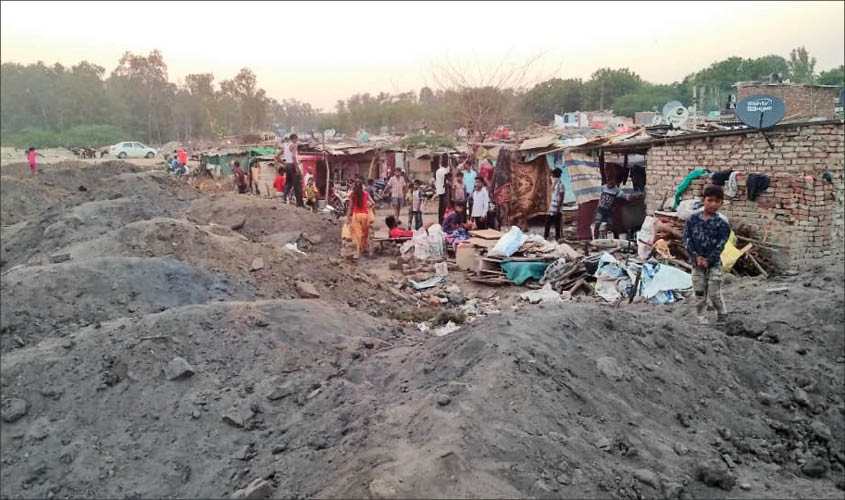New Delhi: The fear of demolition has resurfaced at Shakur Basti, as remaining development work of additional train handling facilities and coaching terminal meter by the railway authorities has already begun.
Sukhbir Singh, the pradhan of the Shakur Basti camp, told The Sunday Guardian that the railway authorities have started land reclamation work. He said, “A few houses have been told to move their settlements as the railways’ work won’t stop.” He added that the families haven’t been promised any rehabilitation.
A sprawling settlement with a population of around 10,000 jhuggis, these slum dwellers live with the constant fear of getting evicted by railway authorities, as these settlers are turning vacant railway land into permanent shelters.
Sonu Ram, 90, who has been residing here for four decades, said, “Some people told us to vacate and when we asked for rehabilitation, they said that we were living on railway land, hence it is not their responsibility to provide them with shelter.”
Sanjay, another resident, confirmed bulldozers have again started arriving here, mostly during night. “No demolition has taken place as of now. However, some officials came with bulldozers at night to reclaim the land. Today, they are just filling the land; tomorrow they will demolish our homes. We have sold our lands and given everything to this place,” he said.
Speaking about coaching terminal facility, Mukesh Kumar, Section Officer, Rural Works Department (RWD), told this newspaper, “I am in no position to comment on the details of the project, as nothing has been decided yet. The project comes under the Land Section of the railways.”
He also said that the Delhi Government provided the slum dwellers with basic necessities. “The Delhi Government believed that till the time these people are not removed, basic amenities can be provided to them; hence facilities like hand pump were made available. Technically, these people are to be removed, but to give them a ‘the life of daily routine’, facilities like electricity and water were provided to be able to sustain,” Kumar added. Singh showed the correspondents government notices of previous years, where the documents appeared vague and few had no official stamps.
He said, “We have received no notice so far. The authorities have visited and measured half the camp which means at least 600 feet will be needed for the project.”
However, Singh said that they have no intention to disrupt the railways’ work. “This is a railway project. We are not asking the authorities not to do their work but provide the poor, who have been living here for the past 30-40 years, a place to stay,” he added.
The pradhan, along with others in the area, wrote a letter to Union Health Minister Harsh Vardhan requesting him to look into the matter and are awaiting his reply.
Residents complained that the mud has led to a water crisis in the area, which was flooded with filthy green water. Sukhbir Singh also said that they are sorting the sewage problems on their own, “because we don’t want to overburden the government”.
It was in 2015 that a Public Interest Litigation (PIL) was filed against forceful demolition by the railways. The slum dwellers were represented by Congress leader Ajay Maken. It was in this case that the Delhi High Court observed the rights of the people living in jhuggis. Quoting the Supreme Court’s decision in the Sudama Singh case, the Delhi High Court acknowledged that the “right to adequate housing is a right to access several facets that preserve the capability of a person to enjoy the freedom to live in the city.”
The court also recognised such persons “as rights bearers whose full panoply of Constitution guarantees require recognition, protection and enforcement”.
One of the oldest residents at the camp said that back in the 1990s, some of the households were issued tokens, which recognised these jhuggis as their formal proof
Ramesh Chanderi, ex-RWD employee and resident at Shakur Basti, said that settlements that are on the way of the project will be removed. “The flats for rehabilitation have already been constructed, but I think, people will only be shifted if the whole camp is demolished.”
Savita, a resident of the camp, said that they have spent their life here and demolishing their homes will leave them with nothing. “Our villages are far away. We work here and still have to live under the threat that our homes may be abolished any time. We have literally lived here, got married
here, had children, grew old here, where are we supposed to go?”
She further said, “Authorities have issued Aadhaar cards and other identification cards with this place as our address. How can they now demolish our homes?”
When these correspondents tried reaching the Divisional Railway Manager’s office, they received no reply.

